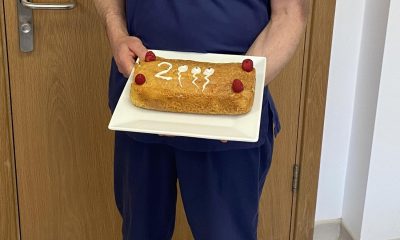By Stephen Beech via SWNS
People with heart defects are at greater risk of suffering severe COVID-19, warns a new study.
Researchers found those with a congenital heart defect who contracted COVID-19 were also more likely to require treatment in the intensive care unit (ICU) or need a ventilator.
Among people at the highest risk for the most severe illness were patients who had a heart defect and another health condition, were ages 50 and older, or were men, according to the study.
There are more than a dozen types of congenital heart defects, which result when the heart or blood vessels near the heart don’t develop normally before birth.
Congenital heart defects are the most common birth defect worldwide, with a global prevalence of 157 per 100,000 in 2017.
Study lead author Karrie Downing said: “Data comparing COVID-19 outcomes among individuals with and without congenital heart defects has been limited."
Researchers examined data on more than 235,000 COVID-19 patients, aged one to 64, hospitalized in the United States from March 2020 to January 2021.
The patients with and without heart defects in the study received care in the same hospitals.
The patients were divided into two groups: those who had a congenital heart defect and those who did not.
Across the two categories, researchers then determined how many required an admission to the ICU, needed a ventilator to help with breathing or died.
Researchers also reviewed other characteristics, including other health conditions.
Of the 235,638 hospitalized COVID-19 patients evaluated for the study, 421 (0.2 percent) had a congenital heart defect.
The analysis found that, overall, 68 percent of the patients with a heart defect also had at least one other health condition noted, compared to 59 percent among those without a congenital heart defect.
More than half the patients with a congenital heart defect (54 percent) were admitted to the ICU compared to 43 percent of those without a congenital heart defect; 24 percent of patients with a congenital heart defect required a ventilator to breathe compared to 15 percent of those without a congenital heart defect.
One in nine patients with a congenital heart defect (11 percent) died during hospitalization compared to seven percent of those who didn't have a congenital heart defect.
People with congenital heart defects consistently remained at high risk for severe COVID-19, even when divided into categories by age or other health conditions noted in the study.
The research team say their findings have immediate, practical relevance for health care professionals as the pandemic continues to evolve.
Ms Downing, an epidemiologist at the National Centre on Birth Defects and Developmental Disabilities in the US, said: “People with heart defects should be encouraged to receive the COVID-19 vaccines and boosters and to continue to practice additional preventive measures for COVID-19, such as mask-wearing and physical distancing.
"People with heart defects should also consult with their health care teams about additional steps to manage personal risks related to COVID-19, given the significantly increased risk of severe infection and serious complications.”
She said that not all patients with heart defects who were hospitalized with COVID-19 had poor outcomes, adding: “More work is needed to identify why the clinical course of COVID-19 disease results in significantly worse outcomes for some hospitalized patients with risk factors for critical COVID-19 illness, like heart defects, and not for others."
The findings were published in the journal Circulation.

 Parenting1 week ago
Parenting1 week ago
 Lifestyle7 days ago
Lifestyle7 days ago
 Wildlife3 days ago
Wildlife3 days ago
 Good News4 days ago
Good News4 days ago
 Health4 days ago
Health4 days ago
 Broadcast1 week ago
Broadcast1 week ago
 Environment1 week ago
Environment1 week ago
 Work2 days ago
Work2 days ago




















